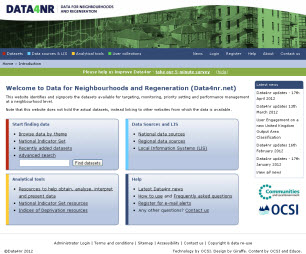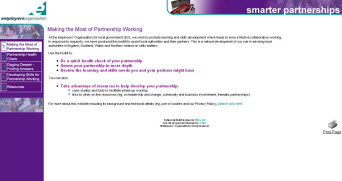Author's posts
In response to the Government’s initiative on Troubled Families, Brighton & Hove Council and partners undertook a short and sharp scoping exercise on how they are need to move forward locally. Alongside in-house research, mapping of service provision and customer journey analysis, we were commissioned to review service delivery models and the associated evidence base on cost-effectiveness. This work featured a review of the ‘direction of travel’ in Community Budget areas and innovative approaches, along with commentary on evidence on cost-effectiveness and summaries of the evolving policy context and knowledge on ‘what works’ in working with families with multiple disadvantage. The review highlighted a number of key issues including:
- finding the money to respond to central government’s offer of up to 40% costs – demanding a well-evidenced business case and means of ensuring fairer sharing of costs and benefits amongst local partners
- strengthening mechanisms for reducing ‘flows’ of families from lower risk groups into situations requiring crisis/ high costs responses
- integrating resources for tackling worklessness (Jobcentre Plus, ESF Families Programme, Work Programme)
- exploring further how families themselves can shape provision and local communities play supportive roles
- ensuring that the necessary skills, knowledge and expertise are in place: not just in working with families, but also in co-design, analysis and evaluation
- translating the costs that are avoided into actual cashable efficiencies that contribute to savings or can be reinvested in activities offering better returns
Permanent link to this article: https://www.educe.co.uk/?p=282
Data4nr.net was a pioneering website signposting neighbourhood-level regeneration and renewal data and resources. It was provided by OCSI and Educe on behalf of Communities and Local Government (CLG).

We worked with OCSI to explore ways of making the site, Data for Neighbourhoods and Regeneration, all the more valuable to users and potential users, leading to redesign of the site. Data4nr.net brought together datasets from a range of providers including Neighbourhood Statistics, Nomis (Labour Market Statistics) and a range of government departments including DWP, CLG and the Department of Health. It organises the datasets by theme, and provides detailed metadata to enable users to locate and interpret the data they need more effectively. In addition, the Data4nr service mapped Local Information Systems and provided links to analytical tools for understanding and using datasets, as well as links to key data suppliers. The refreshed site included:
- links to national indicators and policy outcome data, as well as links to related datasets and resources
- more cross-references on related datasets, for example, to possible denominators or proxy datasets
- news items highlighting relevant material on other sites
- improved navigation and an updated interface, – while still aiming to retain the ease with which you can use the site
Its use was widely recommended for local authorities preparing Local Economic Assessments and Child Poverty Assessments.
Data4nr has since provided a platform for the Government’s Open Data initiative, Data.gov.uk.
Permanent link to this article: https://www.educe.co.uk/?p=224
DWP have worked with local authorities, Jobcentre Plus and local partners in five areas to develop Co-Design Pilots, testing new solutions in tackling worklessness – in a world where local authorities are had to rethink their role, given much reduced resources and the advent of the Work Programme and Community Budgets. The pilots were in Birmingham, Bradford, Lewisham, South Tyneside and Swindon. New ways of working variously related to, eg, working with families; Jobcentre Plus outreach; key workers; personal budgets; social enterprise for employability; and employer engagement; and a youth employment campaign. On behalf of Local Government Improvement and Development – since absorbed within the
Local Government Association, we supported the pilots and wider dissemination. We set out to:
- bring together knowledge and learning from the pilots and parallel developments in other parts of the country
- signpost relevant tools, research and evidence, eg, on customer insight, cost-benefit, and service design and innovation
- highlighting policy developments which are shaping the future terrain
Resources from this work are available for download:
- Customer insight and worklessness: recent contributions to knowledge, evidence and techniques relating to the needs and experiences of customers of worklessness services.
- Cost benefit and value for money resources: materials designed to assist partners in assessing financial costs and benefits in planning and commissioning, business case preparation, evaluation, and so on. It goes beyond ‘worklessness’ in including relevant content on children and young people, health and crime reduction which matter when looking at wider social returns and potential savings to the public purse.
- Evaluation checklist for worklessness co-design: a set of questions, developed for the pilots to help them build in evaluation from the outset (content linked to the appendix in DWP’s interim report which provides a ‘light touch’ cost-benefit framework
- Worklessness co-design pilots: what’s been tried elsewhere?: a briefing on local ‘pilots’ in other parts of the country that have used structured approaches to innovation. These include initiatives stemming from Total Place and programmes such as Family Intervention projects, Drug System Change and Child Poverty Pathfinders which explore similar themes and challenges.
- Tools for worklessness co-design: signposts to tools supporting collaborative planning and commissioning, customer insight and behaviour change, and service redesign and innovation.
The
final DWP Co-design report drew out achievements, lessons and next steps. It also included case studies on each of the pilots, a checklist for local authorities on working with JCP and Work Programme contractors, and an outline of what JCP bring to the partnership table.
Permanent link to this article: https://www.educe.co.uk/?p=272
The Smarter Partnerships website was designed to helps users improve partnership skills and performance.

It included:
- interactive tools to assist individuals, cross-agency teams and partnerships assess both (i) partnership development and (ii) individual and team learning needs. Work your way through the stages, and get advice for actions you can take, appropriate to your circumstances.
- on-line resources: case studies, tools and links to help users address learning needs and improve partnership working
Smarter Partnerships was one of the first partnership toolkits to be developed, and was for a long time the only freely available one which was genuinely interactive, in allowing users to assess their partnership, and their learning needs in real time, and receive feedback on what they can do to address these needs.
We continued to have approaches from other organisations to make use of the materials. Smarter Partnerships tools have featured in their ‘Support for Collaborative Contracting’ package (Learning and Skills Improvement Service), developed to support supply chain partnerships amongst learning providers. Other examples of use included adaptation for an adult basic skills partnership and for an aboriginal drugs and alcohol partnership in Perth, Western Australia.
Smarter Partnerships was developed by Educe for the Employers Organisation for Local Government – now part of the Local Government Association. The project was originally funded by the then Department for Education and Skills, and built on a ‘state of the art’ review ( pdf 205KB) in 2000 of partnerships and local government.
pdf 205KB) in 2000 of partnerships and local government.
Permanent link to this article: https://www.educe.co.uk/?p=139
The Local Government Association (LGA) wished to establish what actions might be needed to ensure local government has access to good quality data and information to help improve services and outcomes for local people, whether it be for needs assessment, service planning, performance management, informing citizens about performance, or more generally, decision-making with partners. With Oxford Consultants for Social Inclusion (OCSI), we undertook took a range of soundings and background research to explore:
- the need for sector action to improve access to, the sharing and use of data, including possibly support in breaking down cultural and other barriers to better use of information
- realistic options for a local government sector-owned function, that will collect, store and make accessible data and information – linking as appropriate to other national systems
A presentation on the project was made to the CLIP (Central Local Information Partnership) annual conference in October 2008.Our report was used by a working group set up the the LGA Improvement Board, whose work was covered by a Local Government Chronicle article on 21 May 2009. In essence, the report concluded that while there is a great deal of data available to councils and partnerships, they do not always have the ability or capacity to use it. There are also gaps in information or it is scattered across a range of sources making it time-consuming to collate. There are key areas where councils could potentially benefit from LGA Group support. These range from small, quick wins such as sharing knowledge on research/data suppliers and services to larger initiatives, eg, on benchmarking. The research provided a foundation for developments around performance data from the LGA, in the shape of LG Inform, which allows councils to access and compare data and present findings. This is part of the LGA’s Knowledge Hub intended to provide the “definitive online environment for local government to produce and capture its own knowledge” – all part of the local government sector taking full responsibility for its own data and improvement needs.
Permanent link to this article: https://www.educe.co.uk/?p=231
The final stage of our place-based work with Improvement and Efficiency West Midlands (IEWM) involved advice to the Coventry Partnership, in support of their IEWM-funded improvement project. This undertook qualitative research with young men (aged 16-35) in one part of the City, seeking to understand better their concerns, motivations and use of local public services. Partners sought to clarify what works and what doesn’t in how they work with different groups within this population, find better approaches and achieve both improved outcomes and savings.We also assisted the Coventry, Solihull and Warwickshire sub-regional partnership, building on their Total Place pilot. This aimed to generate savings, develop radical new forms of service delivery, accelerate performance and spread best practice. Projects within the programme related, eg, to children’s services, adult social care, procurement and asset management, strategic planning and infrastructure. Advice focused, for example, on performance metrics and shared services.
Permanent link to this article: https://www.educe.co.uk/?p=259

![]() pdf 205KB) in 2000 of partnerships and local government.
pdf 205KB) in 2000 of partnerships and local government.